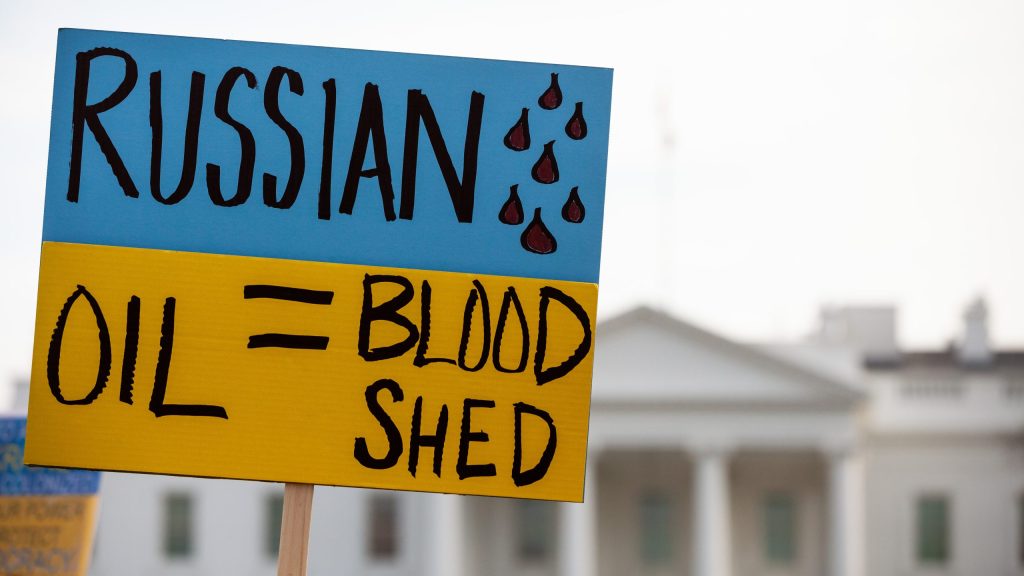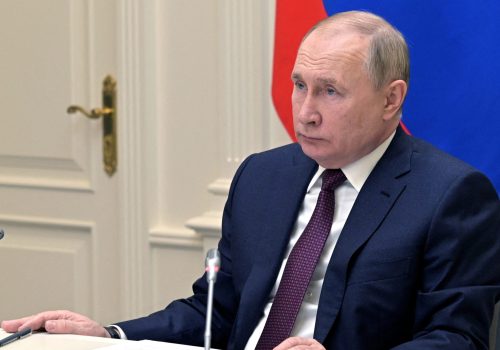The White House escalated its economic campaign against the Kremlin on Tuesday by banning Russian oil imports into the United States. The move comes two weeks into Russia’s devastating, full-scale invasion of Ukraine and follows a raft of financial sanctions that will likely cripple the Russian economy in coming weeks and months.
But will it really hurt President Vladimir Putin? We asked our experts to weigh in on the political and economic impact of Tuesday’s announcement—not only on the Kremlin, but also on the United States and its allies.
How surprising—or not—was this decision? Where does it rank among all the other measures Washington has taken against Moscow since the war began?
This move felt inevitable given the amount of self-sanctioning of Russian energy assets by oil and gas companies, as well as growing momentum within US President Joe Biden’s own party. Late last week it became clear that absent some sort of action by the White House, Congress would pursue a much more ambitious package of energy sanctions which might disrupt the administration’s current strategy. With the amount of companies already moving away from Russian oil purchases—combined with the relatively small amount of oil that is traded between the United States and Russia—most of the impact of this decision was already priced in and will be fairly minimal. It’s much more of a symbolic move.
—Randolph Bell, senior director of the Atlantic Council’s Global Energy Center and Reed Blakemore, deputy director of the Global Energy Center
It had been under discussion, so I was not too surprised. However, it also shows just how serious the crisis has become: Before the invasion in late February, there was a limited number of ways in which US and EU sanctions could be dialed up or down. We always operated under the assumption that energy imports (on either side of the Atlantic) wouldn’t be touched. The biggest surprise remains the recent sanctions on Russia’s Central Bank, especially since they were done in perfect coordination with Western allies (whereas some are still reluctant to join the United States on energy sanctions).
—Charles Lichfield, deputy director of the Atlantic Council’s GeoEconomics Center.
Doesn’t the United States import a tiny amount of its oil from Russia? Why is this move generating so much attention?
Yes, and importantly Russian oil exports to the United States also constitute a sliver of Moscow’s total oil exports—so these volumes can likely also be sent elsewhere, such as Asia. Furthermore, planned US imports of Russian oil have already been dwindling as companies self-sanction themselves from Russian energy assets in response to earlier banking sanctions.
Still, this symbolic action by the Biden administration is a departure not only from its stated commitment to insulate energy consumers from the Ukraine crisis and the possible consequences for resulting oil price-driven inflation, but also from the unity we’ve seen among Western allies throughout this crisis.
—Randolph Bell and Reed Blakemore
The United States wasn’t an export destination for Russian natural gas, but the 8-percent share it represented in Russia’s total oil exports wasn’t insignificant either. And for the White House to announce that it’s cutting off any kind of supply during a time when a barrel of oil costs $125 is a sign that the administration is willing to face domestic backlash for the sake of foreign policy. The move also puts pressure on the Europeans to match the United States.
—Charles Lichfield
Recent reports suggest the United States has reached out to Venezuelan strongman Nicolas Maduro to replace Russian oil. How likely is this (or similar options), and what problems does it pose?
It appears that negotiations have largely just begun and seen little momentum—meaning they’ll do little to provide price relief in the short term. From a crude-market perspective, the opening of negotiations is significant because Venezuela would offer a close-by replacement to the heavier crudes typically delivered by Russian imports (in contrast to the light-sweet crudes produced in the United States). Negotiations with Iran are probably the next-best source of new barrels on the market. Yet the prospects for these negotiations reaching a positive conclusion in the immediate future is unclear. Meanwhile, the Biden administration will attempt to continue coaxing additional production from US shale producers.
—Randolph Bell and Reed Blakemore
While White House officials have indeed traveled to Caracas to explore easing US sanctions on Venezuela, the trouble with this rushed strategy is that it overlooks developments on the ground there and undermines the notion that the United States imposes sanctions for objective reasons. Venezuelan President Nicolas Maduro also feels some kinship with Moscow, and Russia made sure to send a high-level delegation to see him shortly before the invasion began. Meanwhile, attempts to convince the Saudis and the Emiratis to increase their production have failed so far.
—Charles Lichfield
Many advocates for a stronger response to Russian aggression are pushing for a total ban on Russian energy imports. Does Tuesday’s decision help pave the way?
In terms of total diversification away from Russian hydrocarbon resources, those discussions are already underway—though they’re decidedly more medium- and long-term in nature. At least in the short term, Europe is largely unable to completely “turn off” its imports of Russian hydrocarbons, lest it put its own energy security at risk. Nonetheless, it is critical to note that given the considerable impact the war has had on Europe, things that seemed impossible two weeks ago seem possible now. The decision by the United States to put energy on the table as a new front in this crisis opens the door for a much more aggressive approach from Europe.
—Randy Bell and Reed Blakemore
It does add more pressure on the Europeans to reduce their purchases of Russian energy now, rather than promising more long-term plans to reduce dependencies. We are seeing some movement, but nothing as swift or comprehensive as the US ban. On the same day as the United States’ decision, the United Kingdom matched it with its own phase-out of Russian oil imports by the end of 2022. Meanwhile, the European Union unveiled a plan to cut Russian gas imports by two-thirds within a year.
—Charles Lichfield
Further reading
Fri, Mar 4, 2022
The Russian Central Bank is running out of options
New Atlanticist By Charles Lichfield
The now-embattled institution didn't expect to be sanctioned so quickly—and was forced to prepare its response in a hurry.
Fri, Mar 4, 2022
To decipher Putin’s nuclear threats, watch what he does—not what he says
New Atlanticist By Matthew Kroenig, Mark J. Massa, Alyxandra Marine
For years, Moscow has made nuclear weapons a centerpiece of its military doctrine. The West must not capitulate.
Thu, Mar 3, 2022
Europe needs to prepare for a future without Russian energy
New Atlanticist By
One of Putin’s greatest assets is Western reliance on Russia; to move forward, this relationship must shift from one of necessity to one of convenience.
Image: Protesters outside the White House hoist a sign condemning Western purchases of Russian energy on March 5, 2022. Photo by Allison Bailey/NurPhoto/REUTERS



